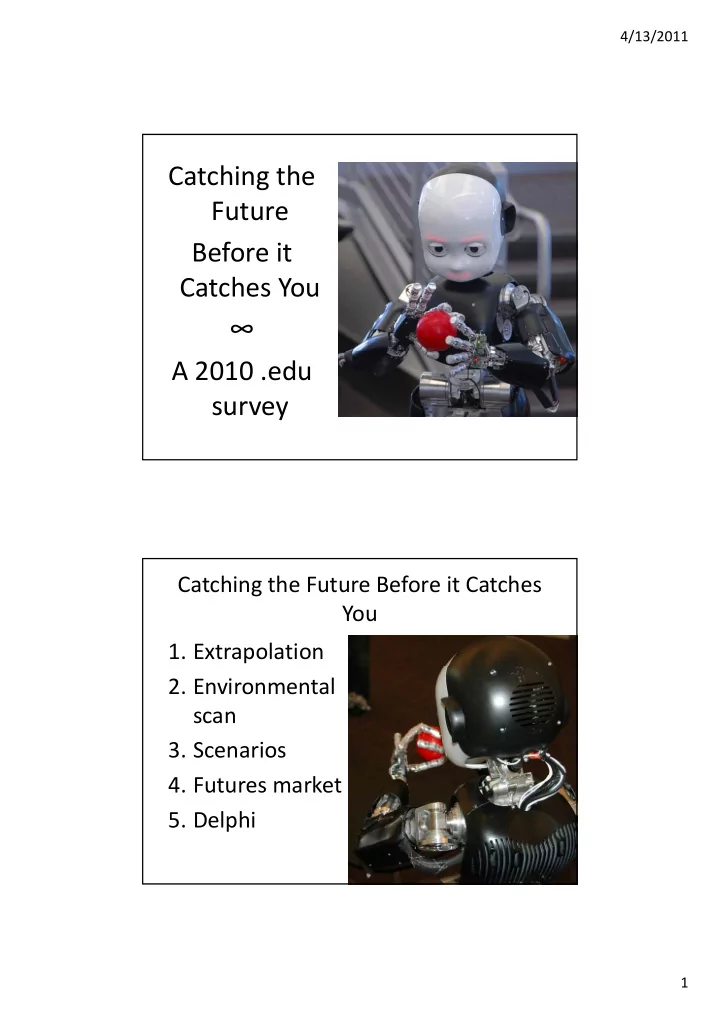

4/13/2011 Catching the Future Before it f Catches You ∞ A 2010 .edu survey Catching the Future Before it Catches You 1. Extrapolation 2. Environmental scan 3. Scenarios 4. Futures market 5. Delphi 1
4/13/2011 Apprehending the futures Principles of Forecasting (2001) (http://www.forecastingprinciples.com/methodologytree.html) Extrapolation iPhone Apps Store downloads 1. April 2009 1.0 billion 2. July 2009 1.5 billion 3. Sept 2009 2.0 billion ‐ works with data sources ‐ can lead to more data ‐ gathering, metrics 2
4/13/2011 Tweak to contexts Limitations • Trend lines vary • Doesn’t account for new things • The Black Swan (Taleb, 2007) 3
4/13/2011 Environmental scanning • Multiple sources • Longitudinal • Pattern recognition recognition Next 20 years? • Screening • Interacting • Interacting • Sharing • Flowing Deductions from • Accessing scanning: Kevin Kelly • Generating 4
4/13/2011 Scan 2.0: crowdsourcing Different levels • Crowd computing • Social network S i l t k • Iterated resource feeds It t d f d Scenarios Stories about futures • Roles and times Event and response • Emergent practices and • patterns • Creativity 5
4/13/2011 Limitations • Culture • Resources • The Black Swan Futures market Features Advantages • Propositions in time • Continuous • Shares to be traded • Distributed feedback • Affordances of play 6
4/13/2011 Will 25 or more institutions be ll b participating in Flickr’s Creative Commons project by March 26, 2009? When will the number of Facebook users hit 200 million? 7
4/13/2011 Limitations • Quantitative threshold • Physical proximity • Market metaphor • The Black Swan Delphi • Assemble experts • Probe for opinions • Rank and distill ideas • Reiterate 8
4/13/2011 Example: the Horizon Report • “[A] comprehensive review and analysis of research, articles, papers, blogs, and interviews h ti l bl d i t i • [We] discussed existing applications and brainstormed new ones. • A key criterion was the potential relevance of the topics to teaching learning research and the topics to teaching, learning, research, and creative expression. • Iteration, ranking, reiteration, reranking” 9
4/13/2011 10
4/13/2011 Limitations • Groupthink • Information compression • The Black Swan Citations • iCub, http://infocult.typepad.com/infocult/2009/09/robot ‐ children ‐ toddle ‐ out ‐ of ‐ the ‐ uncanny ‐ valley.html children toddle out of the uncanny valley.html • Principles of Forecasting chart, http://www.forecastingprinciples.com/methodologytree.html • Dying industries, http://www.ibisworld.com/Common/MediaCenter/Dying%20Indus tries.pdf • Nassim Taleb http //www fooledbyrandomness com/ • Nassim Taleb, http://www.fooledbyrandomness.com/ • Black Swans: Field Museum Library, http://www.flickr.com/photos/field_museum_library/3405475664/ ; gnuckx cc0, http://www.flickr.com/photos/34409164@N06/3209135920/ • Great California Shakeout, h // h k / di /i d h l 11
http://creativecommons.org/licenses/by/4.0/ 4/13/2011 More citations • NITLE Prediction Markets, http://markets.nitle.org/ • Cat and kitten, http://www.flickr.com/photos/bryanalexander • Bing’s Twitter search, http://www.bing.com/twitter g p g • Kevin Kelly’s verbs, http://techcrunch.com/2011/03/29/6 ‐ verbs/ • Episilon Aurigae crowdsourcing, http://mysite.du.edu/~rstencel/epsaurnews.htm • Horizon Report 2010 wiki, http://horizon.wiki.nmc.org/ • “Apprehending the Future: Emerging Technologies, from Science Fiction to Campus Reality”, EDUCAUSE Review, vol. 44, no. 3 (May/June 2009): 12–29. http://www.educause.edu/EDUCAUSE+Review/EDUCAUSEReview MagazineVolume44/ApprehendingtheFutureEmergingT/171774. More sources there. • Wayne Brent, Cyprien Lomas, Ruben R. Puentedura, “Grow Your Own Horizon Report” (Educause conference 2009) The ultimate links NITLE http://nitle org http://nitle.org Techne http://blogs.nitle.org/ NITLE prediction markets game NITLE prediction markets game http://markets.nitle.org/ Bryan on Twitter http://twitter.com/BryanAlexander 12
Recommend
More recommend